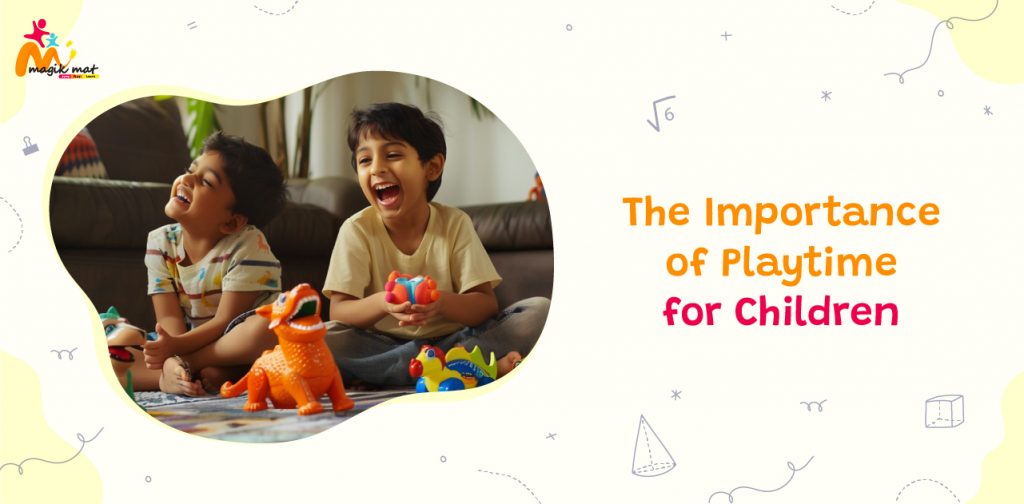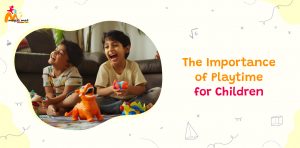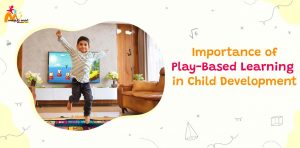Playtime is a crucial aspect of childhood development that extends far beyond mere entertainment. For children, it is an essential part of their learning process, where they engage with their environment, interact with peers, and develop key skills that will aid them throughout their lives. In this blog, we will discuss the importance of play for children, how it contributes to cognitive and social development, and how incorporating educational games like Magik Mat can enhance the fun and learning experience.
Understanding Playtime
As for the definition of playtime, there can be several forms, including physical play, playtime that involves imagination, and constructive play. These activities cannot be termed leisure activities only, but rather are necessary for human growth in terms of mental, emotional, and social development.
- Cognitive Development
Playtime enhances cognitive development in several keyways:
- Problem-Solving Skills: During play, children often face challenges that require problem-solving. Whether it’s building a pillow fort or strategizing in a board game, problem-solving is a natural part of play.
- Enhanced Memory and Concentration: Games and activities improve memory and concentration. Memory games or puzzles engage children actively, enhancing their memory abilities.
- Language Acquisition: Activities like storytelling, role-playing, singing, or using interactive Edutech products like Magik Mat significantly enhance language and vocabulary. These activities encourage children to speak and experiment with new words in context.
- Physical Development
Physical play is instrumental in developing foundational motor skills:
- Gross and Fine Motor Skills: Movements such as running, jumping, climbing, coloring, and block play are crucial for developing motor skills, which are essential for daily activities and future sports.
- Physical Health: Active playtime helps prevent obesity and reduces the risk of illnesses. Outdoor play allows children to expend energy and enjoy fresh air and sunlight, contributing to overall health.
- Social Development
Playtime serves as a critical context for social development.
Playtime is critical for social development:
- Empathy and Understanding: Playing with peers fosters empathy. Children learn to understand and respond to the emotions of others, which is essential for emotional development. Role-play activities further enhance empathy by placing children in situations where they must consider others’ perspectives.
- Conflict Resolution: Playtime often involves conflicts, providing opportunities to teach children how to resolve disputes. Learning to negotiate and compromise during play equips them with conflict-resolution skills for future social interactions.
- Emotional Development
Playtime also promotes emotional growth, such as:
- Expression of Feelings: Free play allows children to express their feelings openly. Through pretend play, they can explore and process complex emotions and experiences.
- Confidence Building: Successfully playing a challenging game or mastering a new skill boosts a child’s confidence. This confidence can positively impact their academic performance and social interactions in various aspects of life.
- The Role of Structured Play
While free play is essential, structured play also offers significant benefits:
- Educational Games: Edutech products like Magik Mat are designed with specific learning objectives. These games, which focus on subjects like math and English, enhance brain function while providing enjoyable experiences.
- Skill Development: Magik Mat includes activities like counting and language games, balancing play with learning. These activities help children develop academic skills in a fun and engaging way.
- Importance of Outdoor Play
Outdoor play is particularly significant for children:
- Connection to Nature: Outdoor play helps children connect with nature, such as appreciating flowers during play. Being outdoors fosters a sense of adventure and curiosity, leading to lifelong learning.
- Variety of Activities: Outdoor play includes diverse physical activities like sports, tag, and mimic games. These activities contribute to the development of a well-rounded personality.
- Digital Play
In today’s digital world, play has also moved indoors:
- Educational Apps and Games: While excessive screen time is unhealthy, educational games and apps, such as those offered by Magik Mat, can be beneficial. These multimedia teaching aids can spark children’s interest and help them learn more effectively.
- Balance is Key: It’s important to strike a balance between digital and traditional play. Children should have opportunities to experience both types of play to develop a broad range of skills.
How to Encourage Playtime
- Create a Play-Friendly Environment: Make your home or classroom a welcoming and fun environment for play. Provide a variety of toys, games, and learning aids that encourage imaginative play.
- Encourage Outdoor Play: Schedule regular visits to parks, nature walks, or play dates to encourage outdoor play. Let children explore and use their creativity in the natural world.
- Limit Screen Time: While digital play has its benefits, it’s crucial to limit screen time. A well-rounded approach that includes physical, imaginative, and structured play is ideal.
- Participate in Playtime: Engage with children during playtime. Play alongside them or introduce new game ideas. Your involvement can help them discover their interests and improve their social skills.
- Incorporate Educational Games: Introduce interactive educational technology tools like Magik Mat and other informative toys that combine learning with play. This approach helps children develop academic skills while enjoying their playtime.
Conclusion
Playtime is a vital component of child development, contributing to mental, physical, emotional, and social growth. The skills children acquire through play benefit them throughout their lives. By establishing play-friendly environments, encouraging both outdoor and indoor play, and incorporating interactive Edutech products like Magik Mat, children can fully experience the advantages of play. In essence, playtime combines fun, learning, discovery, and self-development. Fostering meaningful play helps prepare children to navigate the dynamic world ahead. Providing children with ample time to play is one of the most beneficial actions for their growth and well-being.





